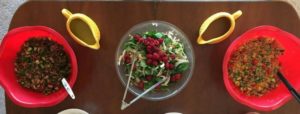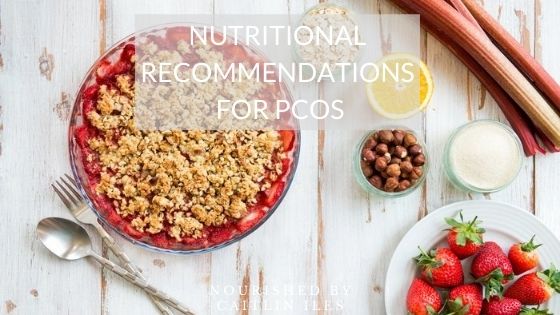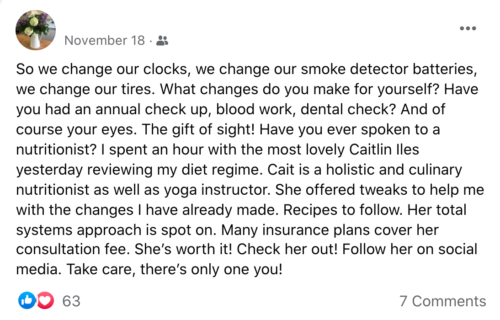Welcome back friend to Part 3 of my PCOS Series! If you haven’t already read Part 1: Intro to PCOS and Part 2: 3 Categories of PCOS then make sure you click the links and get familiar with the most common hormonal imbalance in folks who menstruate in North America.
Today I’m going to share with you some nutritional strategies I’ve used to manage my own PCOS symptoms for the last 10 years and which I share with my clients on a regular basis.
One of my absolute all-time favourite recommendations for PCOS is to drink 1 cup of spearmint tea every day. This study found that drinking spearmint tea every day for 30 days lowered testosterone levels and helped boost LH and FSH. Plus it just tastes so good. I combine it with peppermint, raspberry leaf, and nettle to make a delicious tea blend!
As with any sort of hormonal imbalance in the body, I always recommend eating an anti-inflammatory style diet that is low in refined carbohydrates and grains, inflammatory oils, and dairy. You want to aim to eat lots of veggies, fruits, fish, nuts, seeds, legumes, whole grains (if you tolerate them!), and ethically sourced animal products.
As always, please make sure that you work with your doctor or qualified healthcare practitioner before making any changes to your diet or lifestyle. These are general guidelines and not personalized for your own individual situation. If you want a personalized approach to balancing your hormones, I can now offer receipts for all insurance providers (except Blue Cross/Industrial Alliance) for folks in New Brunswick. PEI, Quebec, & NFLD. You can check out my coaching packages right here.
A Quick Note:
I will be focusing most of the following sections on Type 1 PCOS as it has the strongest link to proper nutrient intake. I will offer a couple simple recommendations for Types 2 and 3, but working with someone knowledgable on these causes is always your best bet.
A good rule of thumb is that for Type 2 you would want to follow an adrenal fatigue protocol and support with stress management, adequate nutrition if undernourished, and decreased exercise if it is contributing to stress.
A rule of thumb for Type 3 (which is often seen in conjunction with Type 1 or 2) is to support the thyroid and ensure the digestive tract is functioning optimally if Hashimoto’s thyroiditis is diagnosed.
I will provide a brief outline below of nutrients and courses of action for Types 2 and 3, but the majority of my recommendations will be for individuals diagnosed with Type 1 PCOS, which is caused by improper blood sugar regulation and excess insulin production leading to an overproduction of testosterone by the ovaries.
Type 1:
Type 1 PCOS has perhaps the most obvious connection with nutrition and proper nutrient intake in terms of prevention and treatment. Since this type of PCOS stems mainly from improper blood sugar regulation and excess insulin secretion, specific dietary protocols focused on low glycemic eating, high fibre intake, minimum of 1 gram of protein per kg of body weight/day, and intake of proper fats, such as omega-3s, to prevent or reverse inflammation are the standard. Below are details on specific serving sizes and daily-recommended intakes for Type 1 PCOS.
-
Macronutrients

Carbohydrates:
The most important thing an individual with Type 1 PCOS can do is to limit the amount of refined carbohydrates they consume on a daily basis.
When carbohydrates are consumed they should be in whole forms and combined with adequate fibre and protein. Studies show that diets which contain the ratio of 30% good fats, 30% protein, and 40% carbohydrate from proper sources (unrefined!) is beneficial for individuals with blood sugar management issues (Balch 375).
The type of carbohydrate is just as important as the amount ingested as they both impact blood sugar levels in different ways. Lower carbohydrate intake combined with a higher fiber intake leads to:
- More stable blood sugar levels
- Less insulin secretion—less testosterone produced by the ovaries—fewer PCOS symptoms and the return of a regular menstrual cycle.

Protein:
As mentioned above individuals with blood sugar regulation issues should consume approximately 30% of their calories or ~1g/kg/day from high quality protein sources.
Protein helps slow the release of food from the stomach leading to a gradual increase in blood sugar. You can get protein from fish & seafood, poultry, ruminants (beef, lamb, etc.), nuts, seeds, and legumes.
Specific amino acids in proteins also have beneficial effects on blood sugar management:
- L-glutamine:
- Reduces sugar cravings (Balch 373)
- Taurine:
- Aids in the release of insulin if required (Balch 373)
Fats:
Certain fats, such as poly or monounsaturated fats can have beneficial effects on inflammation in the body.
Since many individuals with blood sugar and insulin management issues also suffer from inflammation, a therapeutic intake of omega-3 fats, especially from sustainable cold-water fish sources, will help decrease systemic inflammation and by extension help rebalance hormones.
Note: for vegans or vegetarians who do not consume fish, seed oil sources (hemp, flax, camelina) of omega-3s can also be taken though the conversion from ALA to EPA/DHA can be somewhat low in some people. Vegans and vegetarians should also ensure that their omega-3 seed oils do not contain a high proportion of omega-6 fats and that the rest of their diet does not contain too high a proportion as too much of this oil can promote inflammation in susceptible individuals.
Alpha-lipoic-acid is also recommended as it helps control blood sugar levels.

-
Micronutrients:
Different micronutrients (vitamins, minerals, antioxidants) can help the body process blood glucose more efficiently, lower body-wide inflammation, and help regulate the endocrine system. Below are just a few nutrients (and where you can find them!) that can be most beneficial when it comes to managing PCOS.
Chromium picolinate improves the efficiency of insulin by interacting with the cellular receptors that enhance the body’s response to it. Increased insulin sensitivity helps lower blood sugar levels (Balch 373).
It also helps transport glucose from blood into the cells by activating glucose transport molecules (Phillip n.p.). This nutrient is also required to make glucose tolerance factor, a necessary component of blood sugar management. Good sources of chromium include:
- Onions
- Tomatoes
- Brewer’s yeast
- Oysters
- Whole grains
- Potatoes (“Chromium”)
Biotin has been shown to enhance insulin sensitivity and increase the activity of glucokinase, which is the enzyme that is responsible for the first step in glucose metabolism in the liver (Murray 419).
Friendly gut bacteria (lactobacillus) will often produce biotin in the digestive tract, but good food sources include:
- Egg yolks
- Liver
- Brewer’s yeast
- Almonds
- Carrots
- Tomatoes
- Chard
- Onion
- Cabbage (Haas 128)
Vitamin E may help reduce oxidative stress associated with blood sugar fluctuations, and therefore improve physical characteristics of membranes and related activities in glucose transport (Murray 420).
Increased glucose transport leads to more stabilized blood sugar and less insulin secretion. Good food sources include:
- Spinach
- Tomatoes
- Cucumber
- Kale
- Celery
- Asparagus
- Green peas
- Butter
- Egg yolk
- Liver
- Nuts: almonds, walnuts, etc.
- Seeds: pumpkin, sunflower, etc.
- Unrefined, cold pressed nut and seed oils—i.e. rice bran, almond, etc. (Haas 102).
Magnesium is one of my all time favourite minerals and it’s involved in several areas of glucose metabolism inside of the cell and functions best in conjunction with B6, as the intracellular level of this B vitamin is linked to the magnesium content of the cell (Murray 420). Good sources of Mg include:
- Legumes
- Seeds and nuts
- Green leafy vegetables (spinach, kale, lettuces, arugula etc.)
Potassium (best if from food sources) this mineral is associated with increased insulin sensitivity, responsiveness, and secretion (Murray 421). Good sources include:
- Spinach
- Parsley
- Mustard greens
- Broccoli
- Peas
- Tomatoes
- Citrus fruits
- Bananas
- Avocados
- Apples
- Raisins
- Apricots
- Nuts and seeds

Zinc is involved in almost all aspects of insulin metabolism, such as synthesis, secretion, and utilization and so is a beneficial mineral for those with blood sugar and insulin imbalances (Murray 421).
Since individuals with poor blood sugar management and PCOS are at increased risk for developing diabetes, zinc is especially helpful as it helps protect against beta-cell destruction in the pancreas (Murray 421). Good sources of zinc include:
- Oysters
- Whole grains
- Legumes
- Nuts and seeds, especially pumpkin.

Type 2:
Now that we’ve taken a look at the major recommendations for Type 1 PCOS, I want to briefly touch on some of the foods and lifestyle tips that can help with the root cause (generally chronic physical and emotional stress!) of Type 2.
The importance of nutrients in this type of PCOS will vary from person to person depending on the source of their stress. Some individuals may need to consume overall more calories from a variety of sources while some may already be eating enough nutrient dense food, but require a lesson in stress management.
For Type 2 PCOS, the recommendations will mostly be made to support adrenal function.
Vitamin C is a major micronutrient required for proper adrenal function as these glands store this vitamin and use it during times of acute and long-term stress (Balch 153). Great food sources of vitamin C include:
- Bell peppers- red, yellow, orange
- Citrus fruits- oranges, lemons, clementines, limes
- Rose hips
- Acerola cherries
- Strawberries
- Broccoli
- Tomatoes
- Parsley
- Cabbage (Haas 140)
B vitamins are also necessary for proper adrenal function in that they are cofactors of energy production in cells throughout the body. The adrenal glands are especially reliant on pantothenic acid (B6) for proper function (Balch 153). Good sources of B vitamins include:
- Avocados
- Whole grains
- Liver (especially B12)
Another important micronutrient is the amino acid L-tyrosine as it helps relieve excess stress on the adrenal glands and is necessary for proper function (Balch 154). It is the direct precursor of epinephrine and norepinephrine, two hormones produced by the adrenal glands (Haas 54). You should aim for 500 mg/day and some good food sources include:
- Salmon
- Turkey
- Animal proteins
You’ll also want to make sure you’re getting adequate magnesium (see above!) as the adrenal glands love magnesium and use a lot when you’re under stress. There’s also a place for adaptogenic herbs such as maca or ashwagandha. I’ve got lots of yummy recipes that use both!
When it comes to stress management, you may need to take a look at different areas in your life such as whether you are over-exercising, work/life balance, your relationships, financial health, etc. Some things that worked great for me when it came to stress management included meditation, restorative yoga,

Type 3
This form of PCOS can often be found in conjunction with either of the previous types, but the thyroid is likely the most impacted organ.
Nutrients important for the management, prevention, or treatment of Type 3 PCOS are those which have been shown to support the thyroid gland such as iodine.
Iodine is necessary for the production of thyroid hormones (T3 and T4) and without adequate intake metabolism will suffer. Good sources of iodine include:
- Seaweeds: wakame, arame, kelp, nori, kombu
You will also want to take a look at the health of your digestive tract to make sure you’re not suffering from leaky gut!
Whew! That was quite the post! Hopefully you’re feeling a little more educated and empowered when it comes to your hormonal health and delicious ways to help get the nutrients you need to manage your symptoms.
And remember, if you need any extra support to help start 2022 feeling strong and healthy, you can contact me right here to see whether private or group nutrition coaching might be right for you.
I’m registered with the Canadian Association of Naturopaths & Naturotherapists, so I can offer insurance receipts to folks with Naturopath coverage who live in New Brunswick, PEI, Quebec, or Newfoundland. The only companies I can’t issue receipts for are Blue Cross and Industrial Alliance.
Personalized Wellness Planning: Best for folks who have specific health conditions they want to focus on such as PCOS, hormonal imbalances, inflammatory bowel diseases, IBS, etc.
Foundations of Nutrition Private Coaching: Best for folks who want to learn about the foundational concepts of nutrition such as blood sugar balance, probiotics, leaky gut syndrome, inflammatory vs. anti-inflammatory fats & oils, and anti-inflammatory eating. These private sessions will offer an opportunity for use to dig into your personal questions and find some targeted areas to focus on.
Foundations of Nutrition Small Group Coaching: Best for folks who want to learn the foundations of nutrition as mentioned above, but who don’t necessarily need personalized recommendations. It’s also an affordable 4-week option. The price is lower since you don’t get the same level of personalization, but you do get the support of a group.
One-And-Done Check In: I don’t have an official page for these sessions, but they are 1-hour check in sessions. I take a look at your food and mood journal and an intake form you fill out prior to our session. We figure out areas that you’re rocking and support areas that could use a little bit of lovin’. These sessions are $100/hour and include a follow up action step plan with everything we discussed during our session, plus any additional tweaks that I think would help.
As always, thank you for your love and support and have the best 2022!!
Cait xo

What Can I Eat to Manage PCOS





Trackbacks/Pingbacks